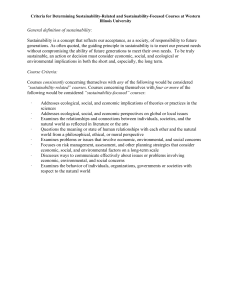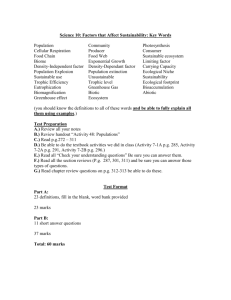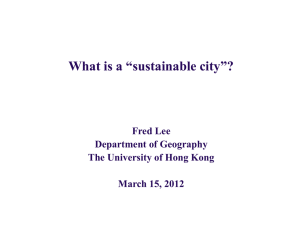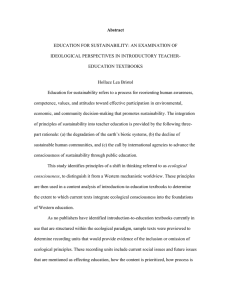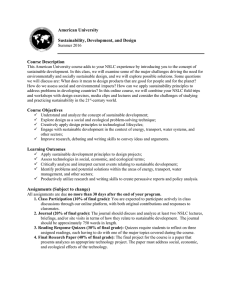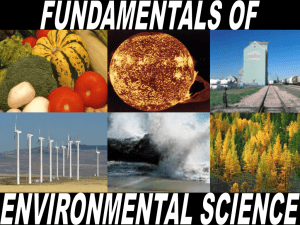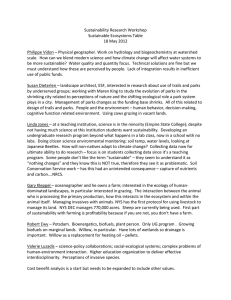Creating Sustainable and Safe Physical
advertisement
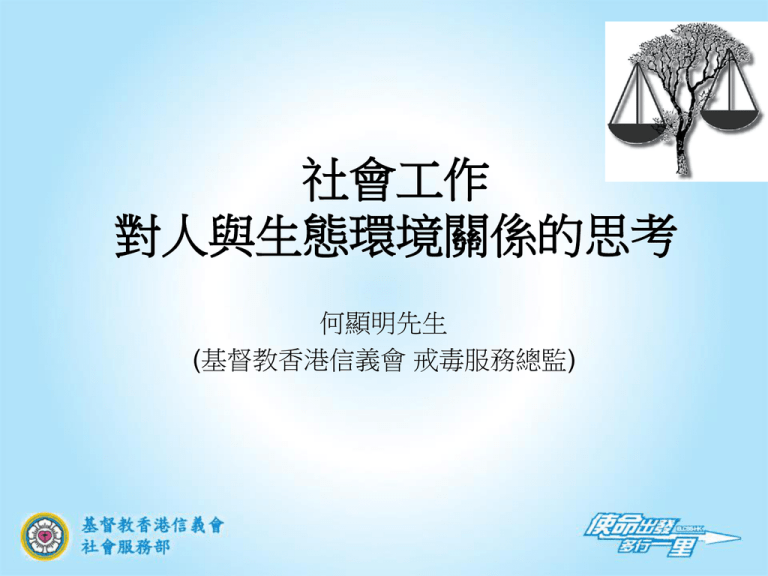
社會工作 對人與生態環境關係的思考 何顯明先生 (基督教香港信義會 戒毒服務總監) Creating Sustainable and Safe Physical Environments 如何創建可持續和安全的生態、環保社會工作 Plenary Session 1 • Social and gendered impacts of climate and environmental disaster events - social work responses (Margaret Alston) Creating Sustainable and Safe Physical Environments 如何創建可持續和安全的生態、環保社會工作 E-poster Topic • Addressing food insecurity for vulnerable groups: Collaborating with faith-based services (Heather Boetto-Australia) • Barriers towards solar energy development for safe and sustainable social wellbeing: A Malaysian case (Azlinda Azman-Malaysia) • Social and policy development agenda in advocating renewable energy for sustainable and safe physical environment (Jamalludin Sulaiman-Malaysia) • Family inequality (Erdenechimeg Choijiljav-Mongolia) • Environmental sustainability: Convergence and divergence in urban and peri-urban zones – a place for social work (Raquel Marta-USA) • Elder abuse in a Japanese city: Current status and intervention (Tsuzuru Mizugami-Japan) Creating Sustainable and Safe Physical Environments 如何創建可持續和安全的生態、環保社會工作 • Community organizing and networking among marginal fishermen and related stakeholders: An innovative way of coastal and marine resource management (Huberto Zanoria-Philippines) • Public policies, youth and sustainability (Cristiane FernandezBrazil) Creating Sustainable and Safe Physical Environments 如何創建可持續和安全的生態、環保社會工作 Violence • The Indian state initiative towards curbing human trafficking: A cross state analysis (Pamela Singla) • Ally “safe zone” program (Erik Schott) • Meanings of the peace and the violence of the people of the communes of the Bucaramanga municipality (Jessica Collante) • Women’s voices on communal violence in Kandhamal district, Orissa, India (Geeta Balakrishnan) Creating Sustainable and Safe Physical Environments 如何創建可持續和安全的生態、環保社會工作 Disasters • Terrorism and social work: Perceptions of what social workers need to know (S A Crabtree & J Parker) • Romancing the storms: Local government units’ managing crisis situations (Rosario Sequitin) • Post conflict resettlement experiences of displaced individuals in northern Uganda (Joanne Corbin) • The assessment of household vulnerability to climate change induced disasters in rural areas: implications for social work (Allucia Shokane) • Gender and climate change- are women in the developing world the collateral damage of global inaction? (Margaret Alston) Creating Sustainable and Safe Physical Environments 如何創建可持續和安全的生態、環保社會工作 Child, youth and family • Using expressive arts in relapse prevention of young psychotropic substance abusers in Hong Kong (Hau Lin Tam) • Living in dangerous times: the experiences of adolescents of exposure to drugs in their social environment (Stephan Geyer) • Social work intervention in creating sustainable and safe physical environment for displaced indigenous people (Keshav Walke) • Listening and learning on the streets: Homelessness in Addis Ababa (Ashenafi Baynesagn) Creating Sustainable and Safe Physical Environments 如何創建可持續和安全的生態、環保社會工作 Education • Conceptual and historical analysis of ecological social work (Kati Nahri) • Ecological literacy: An emerging goal for social work education (Peter Jones) • Educating for sustainability in social work (Avery Calhoun) • Is social work really greening? Exploring the place of sustainability in social work codes of ethics (Wendy Bowles) • Public administration without borders (Alexander Dawoody) Creating Sustainable and Safe Physical Environments 如何創建可持續和安全的生態、環保社會工作 Future of SW • Making a big impact with a small footprint: infusing ecological consciousness into the college of social work (Meredith Powers) • Indigenous epistemology at the centre of all social work education (Lynda Coley & Danny Hona) • Making the case for social work: honoring, promoting and positioning the profession (Robert Arnold) Creating Sustainable and Safe Physical Environments 如何創建可持續和安全的生態、環保社會工作 Sustainability and climate change • Mainstreaming a gender perspective to climate change adaptation (Jocelyn Hermoso) • Ecological social work: towards a framework for practice (Heather Boetto) • Poverty, inequality and cliemate change in developed countries: Adapting critical social infrastructure for climate extremes (Emily Hamilton) • Social development of Bedouin women of the Negev through environmental activism (Julie Cwikel) • Collective actions as an element construct environmental awareness in a global society: the Brazilian indigenous movement (Jose Querino Travres Neto) Creating Sustainable and Safe Physical Environments 如何創建可持續和安全的生態、環保社會工作 Perspectives of environment in Hong Kong • • • • • • • • Person in situation, (Pincus and Minahan 1973) Person in social environment, (Miley, O’Melia, and DuBois 2004) Immediate and distant environment, (Sheafor and Horejsi 2006) All training materials offered for conducting person-in-environment assessments do not include physical environment (Garvin & Seabury, 1997; Compton, Galaway, & Cournoyer, 2005; Gilgun, 2005; Poulin, 2005; Sheafor & Horejsi, 2006) Threats of natural world and associated quality of human life fall in the scope of environmentalism but not social work (Zastrow 2004) logical consequence: perceiving environment as social environment: social environment: social workers concerned natural environment: tackle by environmentalist, scientist Creating Sustainable and Safe Physical Environments 如何創建可持續和安全的生態、環保社會工作 “Environmental justice” and “Social justice” Environmental Justice: • fair distribution of environmental benefits and burdens • an interdisciplinary body of social science, includes theories of environment, justice, law and governance, policy and planning, development, sustainability, and political ecology • recent movement focuses on concept of equality and fairness in the distribution of environmental harms and benefits • right to live and work in areas free from environmental harms, such as air, water and soil pollution, excess noise and illegally taking flora and fauna • the rights of affected communities in decision-making • refers the impacts on specific populations Creating Sustainable and Safe Physical Environments 如何創建可持續和安全的生態、環保社會工作 Environmental Justice Implications to social work 社會工作對人與生態環境關係的思考 墨爾本的環境 •安全的環境與責任 •鼓勵使用免費單車及專用路面 •私家車的密度與停車空間 •動物使用路面及空間的尊重 •無家者的冲身及飯餐設施 •自助餐及消費主義 安全的環境與責任 免費單車及單車徑 企鵝歸家 鸭仔過馬路 無家者的冲身及飯餐設施 青年極限運動場公園 • 無障礙城市建設進度 • 城市規劃是否符合服務需求(精神健康/老人院舍) • 戒毒院舍/生態環境:離開戒毒村以後重投原有社 區的生態 • 青年發展的局限 • 政策:被動>互動>主動 • 管理服務數字迷思 Coates (2003) put things very clearly: “Social work has the choice of continuing to support a self-defeating social order or recreating itself to work toward a just and sustainable society.”

